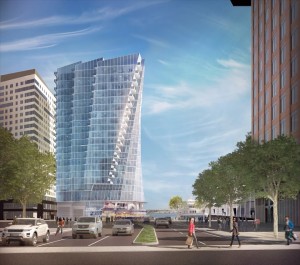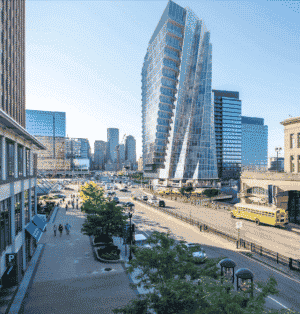A 22-story condominium tower on Boston Harbor would provide “extraordinary private benefits” while violating state regulations protecting public access to the waterfront, the Conservation Law Foundation argues in a lawsuit challenging the 150 Seaport project by Boston-based developer Cronin Group.
The lawsuit filed in Suffolk Superior Court seeks to overturn an amendment to the city’s municipal harbor plan which guides development on a section of the South Boston waterfront. It names Cronin Group and Massachusetts Secretary of Energy and Environmental Affairs Matthew Beaton as defendants and seeks an injunction blocking the issuance of a Chapter 91 license for the project.
Non-water dependent projects built along tidelands should be designed to attract substantial public activity on the site on a year-round basis, CLF argues in the lawsuit. It cites a minimum requirement that such developments include at least one facility that promotes water-based activity.
“The project at issue here has no public facilities promoting water-based activities and no active or passive public recreation areas with related amenities,” the lawsuit states.
In a prepared statement, Cronin Group defended the changes in the municipal harbor plan and project benefits.
“With the exception of CLF, virtually all comments have been very favorable and have recognized the project’s significant contributions to waterfront access, Martin Richard Park, senior affordable housing in South Boston, climate resiliency and public arts programs,” it states. “CLF has been an outlier, and its opposition to the project is at odds with the way the project has been received by the public, neighbors, waterfront activists, the city of Boston and the state.”
As a condition of the approval, Cronin Group agreed to pay $1.5 million toward construction of Martin’s Park near the Boston Children’s Museum, set aside a public waiting area in the lobby and build a 10-foot-wide walkway around the tower.
The state’s Chapter 91 waterfront regulations limit density of development on waterfront sites, with building footprints typically limited to 50 percent. Developers can obtain waivers if they agree to pay for projects that improve public access and recreational opportunities.
The $260 million 150 Seaport project would cover 75 percent of the site, while the approved height of 250 feet exceeds the Chapter 91 standard by 195 feet. Cronin Group plans to demolish the Whiskey Priest and Atlantic Beer Garden restaurants to build a 124-unit condo tower with ground-level restaurant space and a waterfront boardwalk.
 The suit also claims that Cronin Group never obtained one of two state licenses needed to operate the restaurants on a site previously used as a seafood processing facility.
The suit also claims that Cronin Group never obtained one of two state licenses needed to operate the restaurants on a site previously used as a seafood processing facility.
Under the terms of the public benefits required under one Chapter 91 license, Cronin Holdings has failed to maintained public open space between the restaurants and the relocated Old Northern Avenue, the lawsuit claims. The owners also failed to build a ramp and floating dock and make walkways and open space available to the public, it states.
The Boston Planning and Development Agency amended a municipal harbor plan that spells out public benefits for waterfront projects and approved the 250-foot-tall tower in August. Beaton approved the amendment on Dec. 21 and denied CLF’s petition to reconsider on Feb. 1.




 |
| 

